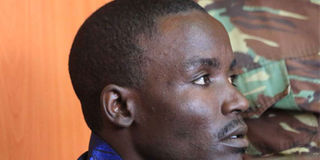Former Kenya Power guard in court over nephews' deaths

Mr Andrew Luvoga Sukunwa at the High Court in Nyeri on October 12, 2018 in a case in which the DPP wants him put him to his defence for allegedly killing his three nephews. PHOTO | JOSEPH KANYI | NATION MEDIA GROUP
What you need to know:
- The children burned to death in a house fire believed to have been started by Mr Sukunwa
- Officer tells court the accused had also threatened to kill the children's aunt
- Defence lawyer however says the fire could have been caused by anyone else as the woman's family did not approve of the couple's relationship
A former Kenya Power Company security guard accused of killing his three nephews after he was divorced by his wife has asked court to acquit him.
Mr Andrew Luvoga Sukunwa, through lawyer Lucy Mwai, yesterday said the evidence produced by the prosecution witnesses was not convincing and he should not be put to his defence.
While appearing before Justice Teresia Matheka, the lawyer said the accused was arrested on a mere suspicion.
HOUSE FIRE
The judge heard that the three children aged between one and four years burned to death in a house fire believed to have been started by Mr Sukunwa.
The remains of the three girls were found in one corner of their house at Mathari village, Nyeri Town Sub-County.
The case investigating officer, police constable Ferdinand Kazungu, said Mr Sukunwa was bitter after the children’s aunt Josphine Wangechi divorced him.
He is accused of committing the offence on March 16, 2016.
The officer said the accused had also threatened to kill Ms Wangechi and before the fire, he had destroyed her mobile phone. “The accused went to the homestead carrying a container of petrol and threatened to burn everything including the children. I spoke the children’s grandmother who said there was a bad relationship between the family and the accused,” said Mr Kazungu.
COLLEGE DROPOUT
But his lawyer, while exonerating the accused, said the fire could have been started by another person in the village.
“The accused and his wife’s family had a strained relationship. The family did not approve of the couple's relationship. His wife’s father swore that the accused would never become his in-law because he had impregnated his daughter and forced her to drop out of college,” Ms Mwai told the court.
She added: “It was never clear if it was a disagreement based on tribe. The wife’s mother was also against the relationship and she testified that at some point she had hid the daughter elsewhere with the help of a missionary sister to break up the two."
According to the lawyer, since Mr Sukunwa surrendered himself to the police for fear of being lynched by the village youth, his conduct was of an innocent person. “He lived in the same village. There is a possibility of someone else having lit the house on the fire. There could be other enemies of the family in the village,” said Ms Mwai.
The investigating officer had told the court that the suspect burnt the house using petrol which he carried in a jerrican. But Ms Mwai said the witness was unable to give details of the jerrican such as the size and colour of the container.
OFF DUTY
The case prosecutor Kennedy Magoha was adamant that the accused should be put to his defence, arguing that the 10 witnesses who testified in the case were firm and collaborating. “There is no doubt about the relationship of the accused and the children. The accused was seen in the vicinity of the home on the particular date and although he was a security guard, that day he was off duty,” said Mr Magoha.
“He surrendered to the police claiming his life was in danger. That is an indication he committed the crime. Nobody was after his life. The children had been left at home by their grandmother and he took the opportunity to commit the crime,” Mr Magoha told the judge.
He pleaded with the court to find that Mr Sukunwa has a case to answer.
The court will make a ruling on November 9.





